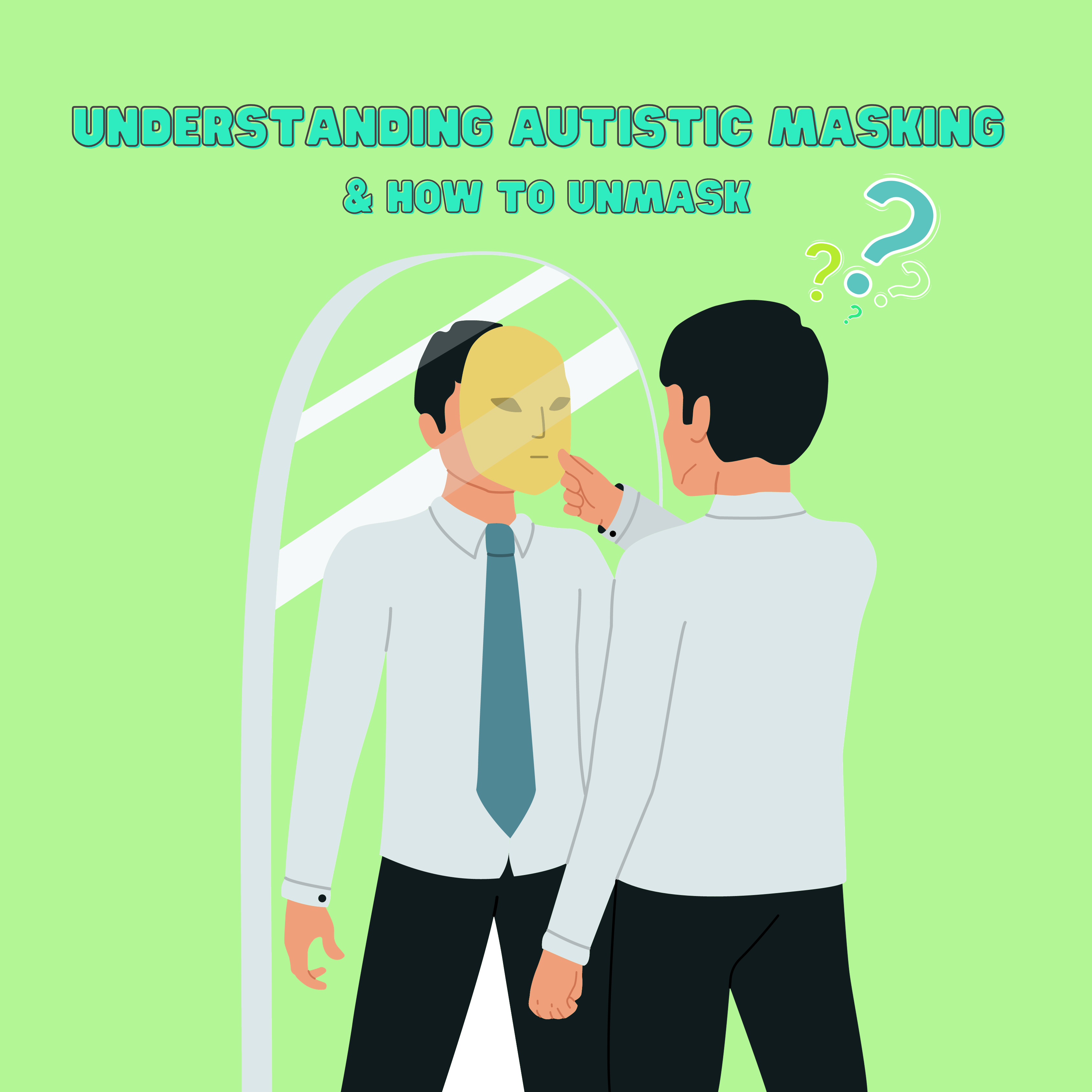Autistic masking is when individuals on the autism spectrum adapt their behaviors to fit into a neurotypical world. This adaptation often involves suppressing natural autistic traits and mimicking neurotypical behaviors. Masking can include controlling stimming, maintaining eye contact, and mimicking social cues. It requires constant vigilance and energy, leading to exhaustion and a loss of self-identity. My personal encounter with autistic masking became evident through my brother's experiences when he transitioned into public school. Day after day, he would return home visibly exhausted and emotionally drained. I observed him frequently zoning out as he grappled with the overwhelming inability to forge friendships and the weight of bullying. These experiences manifested in mental breakdowns, a distressing signal of the impact that masking and social alienation had on him. He was trying to adapt to societal expectations that demanded constant effort to keep up with. The reasons behind masking are complex, including the desire to avoid negative social consequences, bullying, or simply to make social interactions less complicated. However, this constant performance can lead to increased anxiety, depression, and a sense of isolation. The realization of one's masking can be a moment of clarity and confusion, as detailed in the experiences shared on Weird Sensitive Creatures. It shows how individuals have altered themselves to fit a mold that was never meant for them. Understanding the essence of autistic masking is the first step in addressing its impacts and moving towards a more authentic life.
The Journey of Unmasking
Unmasking is the process of gradually shedding the behaviors that hide one's autistic traits and embracing one's natural self. It's a journey of self-discovery, acceptance, and, often, liberation. However, unmasking is a complex path. It's filled with self-reflection, challenges, and reevaluating one's place in a largely neurotypical world. The journey begins with recognizing one's masking behaviors and understanding their reasons. It involves confronting the fear of rejection and the uncertainty of stepping into an uncharted territory of self-expression. Unmasking requires courage and resilience, as individuals may face misunderstandings, prejudice, and even loss of relationships. However, it also offers the potential for deeper connections, self-acceptance, and a more authentic life. The journey is unique for everyone, influenced by personal circumstances, safety, and the environment. For my brother, the path to unmasking in school was gradual. With the support of teachers, understanding students, and our family's encouragement, he slowly began to open up again. This environment fostered a sense of safety and confidence, making him feel secure enough to reveal his true self and embrace his identity. The journey of unmasking is a personal decision with no set timeline or roadmap, and every step towards unmasking is a step toward living more authentically.
Steps to Begin Unmasking
Unmasking is a deliberate and often challenging process, but it can lead to a more authentic and fulfilling life. The first step is self-reflection, understanding how you behave alone and what parts of your behavior are for others' comfort. This awareness is crucial in distinguishing between your true self and the mask you wear. Next, it's essential to recognize the behaviors you've adopted to fit in and consider how they align with your authentic self. This might involve challenging internalized societal norms that have long dictated what is considered 'normal' or 'acceptable.' Rediscovering your passions and interests, often suppressed during masking, can be a joyful and empowering aspect of unmasking. It's also vital to find a supportive community, whether online or in person, where you can share experiences and strategies with those on a similar journey. Professional guidance from therapists or specialists in autism can provide valuable support and tools for navigating this process. Unmasking doesn't mean abandoning all adaptive behaviors but making conscious choices about what you maintain for your well-being and what you let go of to live more authentically.
Embracing the Unmasked Self
Embracing the unmasked self is more than just removing a facade; it's about rediscovering and celebrating who you are at your core. The journey can lead to a profound sense of freedom and self-acceptance. As you peel back the layers of masking, you may experience a range of emotions, from relief and joy to fear and uncertainty. It's a process that can reshape your understanding of yourself and how you relate to the world. Embracing your unmasked self allows you to live more authentically, making choices that align with your needs and desires. It can lead to deeper, more genuine relationships and a sense of community with others who appreciate the real you. However, it's also important to acknowledge that this journey can be challenging. You may encounter resistance or misunderstanding from those accustomed to your masked persona. It's a path that requires courage, self-compassion, and patience. But for many, the rewards of living an authentic life far outweigh the challenges. Embracing the unmasked self is not just about personal liberation; it's about contributing to a more inclusive and understanding world.
Conclusion
Understanding autistic masking and learning how to unmask is a deeply personal, often challenging journey. It's about finding a balance between societal expectations and personal authenticity. For those embarking on this journey, remember that it's not about immediate transformation but gradual, self-compassionate progress toward a life where you can be your true, unmasked self. Unmasking can be as unique as the individuals themselves, influenced by personal experiences, environments, and the support systems available. It's a journey that requires patience, understanding, and a strong sense of self. As you navigate this path, remember that you're not alone. There's a growing community and a wealth of resources available to support you. Embracing your unmasked self is a courageous step towards a more authentic and fulfilling life, and it's a journey worth taking.


